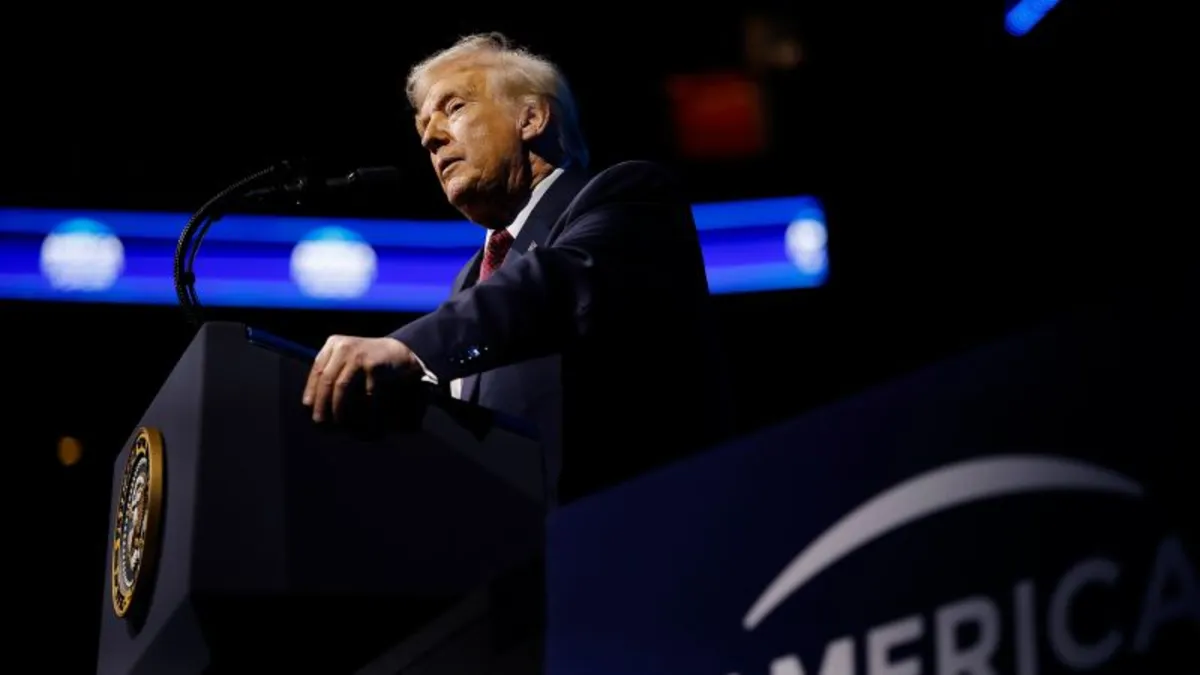
In the wake of a disappointing election night for Republicans, President Donald Trump spent the following morning reflecting on the results and articulating his conclusions. His analysis revealed three key insights about the Republican Party's current standing and messaging strategy. First, Trump recognized that the GOP is losing the communication battle surrounding the prolonged government shutdown, which has now reached record lengths. During a meeting with GOP senators over coffee and orange juice in the State Dining Room, he emphasized this concern.
Secondly, Trump expressed the belief that any election without his name on the ballot poses a significant challenge for the Republican Party. This perspective comes despite his own unlikelihood of appearing on a ballot again. Lastly, he criticized his party for failing to adequately highlight his economic accomplishments, such as the creation of new factories and job opportunities. “I tell Republicans, you want to win elections, you got to talk about these facts,” he asserted during a financial conference in Miami, shortly after his breakfast meeting with senators. “You know, it’s really easy to win elections when you talk about the facts.”
In his assessment of the Republican Party's shortcomings in promoting his policy successes, Trump echoed a sentiment familiar to many past presidents facing political challenges. He suggested that if the public were better informed about his administration's actions, the political fortunes of the GOP would improve. “It doesn’t just happen. You have to tell them,” he remarked during his speech, reminiscent of former President Joe Biden lamenting the lack of understanding surrounding his economic agenda, or Barack Obama wishing he had better communicated the benefits of the Affordable Care Act.
However, Trump himself often diverges from emphasizing his policy achievements. Even during a speech labeled a “major economic address” marking the one-year anniversary of his 2024 victory, he strayed into various unrelated topics, including transgender weightlifters and his nostalgic memories of working a drive-thru at McDonald's. Notably, he spent more time reminiscing about last year's election than addressing the recent voting results, which were less favorable for the GOP.
Trump's mood reflected a sense of nostalgia, likely influenced by the stark contrast between the recent results and those from a year prior. He remarked, “On November 5, 2024, the American people reclaimed our government, we restored our sovereignty – we lost a little bit of sovereignty last night in New York, but we’ll take care of it,” referencing the electoral success of Mayor-elect Zohran Mamdani. Trump then introduced a new political slogan: “We have a choice between communism and common sense,” a phrase he repeated throughout his address.
Despite his criticisms of Democratic economic policies, Trump’s insistence that Republicans need to focus more on economic issues indicates a recognition that the long-held advantage the GOP enjoyed in economic matters is diminishing. “They have this new word called affordability, and they don’t talk about it enough. The Democrats did,” Trump explained in a later interview, acknowledging the need for Republican messaging to adapt to contemporary economic discussions, particularly in light of rising costs of living.
The recent victories of Democratic candidates in states like New Jersey, Virginia, and New York highlighted the importance of addressing the cost of living in political campaigns. These candidates effectively positioned Trump’s policies as contributors to increasing prices of essentials like groceries and electricity, countering his narrative of an economic turnaround. As midterm elections approach, Trump’s aides have signaled that economic issues will take center stage, with a concerted effort to address rising prices and living costs.
James Blair, the political director for Trump’s 2024 presidential campaign, emphasized the president's awareness of the current economic climate and the need to focus on cost-of-living issues. “The president is very keyed into what’s going on, and he recognizes that it takes time to do an economic turnaround, but all the fundamentals are there,” Blair stated, indicating a strategic pivot towards economic messaging as the GOP prepares for critical elections that will shape the balance of power in Congress.
In his first nine months, Trump has often prioritized foreign affairs over economic issues, engaging with global leaders and negotiating peace agreements. However, this focus has sometimes overshadowed pressing domestic concerns. Critics have noted that Trump’s dismissive comments regarding inflation and rising grocery prices do not align with the realities faced by many Americans. Polls reflect widespread dissatisfaction with the current state of the economy, with 72% of respondents labeling it as poor and a significant portion attributing it to Trump’s policies.
As the 2026 elections loom, Trump’s ability to recalibrate his economic messaging will be crucial. His fellow Republicans, who have been hesitant to critique him following recent losses, will be looking to Trump’s leadership to navigate the party through challenging times. House Speaker Mike Johnson affirmed Trump’s commitment to the GOP’s success, stating, “He’s fiercely committed to us winning. He is going to help,” underscoring the importance of Trump’s involvement in campaigning as the party looks to regain momentum.